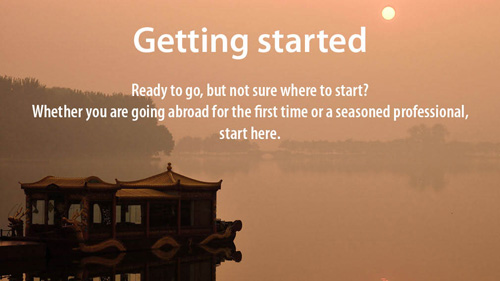There are three things that virtually all international employers seek in applicants:
- global or international competencies;
- overseas experience;
- skills in your sector.
Developing your international competencies will help you to decide if international work is, indeed, for you. It will also help you to be more effective in any international position you obtain. Global competencies are discussed in detail in the introductory section.
Much of the information in Careers For Globetrotters is aimed at gaining experience overseas or setting yourself up for work in specific career areas abroad. But don’t wait until you’re abroad to begin cultivating relevant skills and attitudes. Start while you are on campus and in your home community. This will prepare you for your first overseas experiences, and also give you a head start in seeking out international work.
This section contains some ideas to get you started. It is by no means exhaustive, so use your creativity!
1. Integrate global elements into your studies
- Take courses with a global component that both demonstrate and develop your interest in global issues;
- Select electives with an international component;
- Enroll in, and persist with, language courses;
- Select a topic for your thesis or term paper that puts you in touch with key international players in your field of interest;
- Investigate research assistant opportunities with faculty who focus on international topics;
- Find conferences in your field with an international theme, and opportunities to attend or volunteer.
2. Learn a language
- Exchange conversation lessons with a foreign student;
- Take online language courses; many public libraries offer online courses for free, or you can purchase online courses or audio courses;
- Go on exchange to a country whose language you want to learn;
- Take a summer course for credit in a foreign country; live in a home-stay and take intensive language training while you are there. This can be done relatively cheaply in some parts of the world.
3. Get involved with international student organizations on campus
Most university and college campuses—and even many high schools—host a range of international student groups. These are a perfect way to meet international and globally-minded students, develop networks and work with international teams.
Some better-known groups include: Model United Nations, Engineers Without Borders, Global Brigades, Journalists for Human Rights, Oxfam, Amnesty International, and AIESEC. Usually, various student societies will exist as well (e.g. Caribbean students society, etc).
If your campus is lacking a group that aligns with a particular interest of yours—or does not have a chapter of a particular international student group—why not start a local chapter?
4. Take international study opportunities offered through your study abroad office or faculty
These opportunities are available to you only while you are a student; don't miss out.
- Study abroad for a semester or a year at partner schools;
- Check out faculty-run field schools in various parts of the world; often you may join a field school from another university and arrange credit at your school;
- Volunteer in your international office, for example, to welcome new international students, or organize internationally themed events.
5. Volunteer in a cross-cultural setting
- Teach English in your local community, to recent immigrants or foreign students;
- Help organize or attend events put on by the international office on campus. This will put you in a cross-cultural setting, but also enable you to develop marketing skills, communications skills, social media, organization skills;
- Check opportunities to volunteer internationally online – see for example UN Volunteers (onlinevolunteering.org);
- Volunteer at a globally-minded local organization.
6. Network
Actively grow your network and seek out people in the sectors and countries that interest you. Check with your careers office or study abroad office for possibilities, as well as:
- Alumni networks at your university
- Mentorship programs that can put you in touch with alumni in your field or country of interest, for career-related advice and assistance;
- LinkedIn and Facebook alumni groups where you can contact graduates in your field/country of interest;
- Search for alumni of your school and university on LinkedIn using the Alumni Tool (start at gaining experience overseas) and narrow them down by country, field, company, skills, etc.
- Conferences or events in your field of interest
- Get involved with organizing conferences on campus;
- Assist with choosing and booking speakers you would like to meet;
- Meet and work with university faculty in the fields you are interested in;
- Attend conferences outside the university- many professional conferences offer student rates or accept students as volunteers;
- Join professional membership organizations in your field.
- Don't forget your personal contacts: friends, family friends, co-workers, colleagues, student group members. Don't forget high school principals, teachers, careers counsellors, etc.
7. Information interviews
The purpose of informational interviewing is not to get job offers, but to learn about a field, help you decide if it might be a good fit for you, and find out how people get into the sorts of positions that interest you. You may also find out about jobs before they get posted. This is also a good opportunity to get your resumé in front of people who may be hiring, without asking for a job and without the competition of other resumés.
One out of every 12 informational interviews results in a job offer. These are much better odds than simply applying for jobs: only one out of every 200+ resumés results in a job. Informational interviewing is a great networking technique.
Tips for success:
- Come prepared: research the company, the types of work and positions, and the person you will be speaking with thoroughly;
- Prepare a list of questions, and have someone check them to ensure you are not missing anything. Don’t ask questions in an informational interview that a few minutes of research on the web could have answered for you.
- It is also customary and expected that you ask your contact if there is anyone else that they would recommend you speak with to get another perspective on the field;
- Be respectful of the person's time and do not overstay your allotted time;
- Don't forget to follow up with a sincere thank you;
- Stay in touch: develop a strategy for this, and at a minimum make the connection on LinkedIn.



